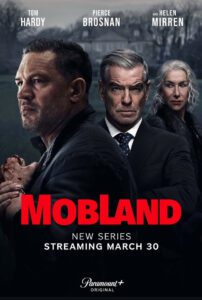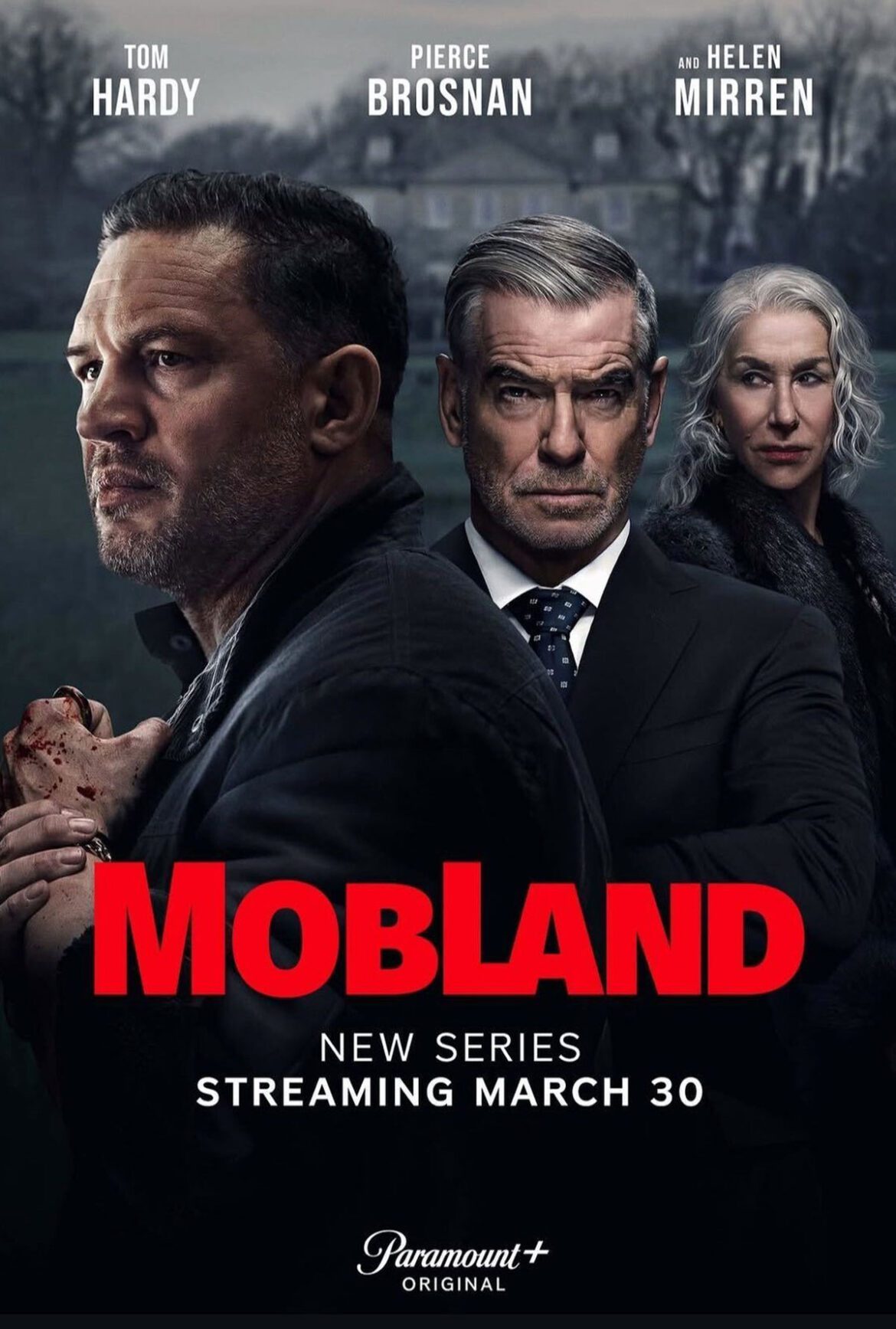
Service: Paramount+
Creator: Ronan Bennett
Season Year: 2025
Watch: Paramount+
There is a definite generic quality to the series name MobLand. Yes, you have the capitalized ‘L’ in the middle of the title, but it is instantly forgettable. It’s not the James Mangold movie, Cop Land. Nor the criminally lost-to-time TV series, Southland. Nope, it’s an organized action crime drama set in London and just because it sounds like a lot of other pieces of media, it is… well, it’s just not that different at the end of the day than any of these mob shows with its paternal leader, gang of henchmen, familial conflagrations and the guy at the center of it all: the mob fixer (who isn’t technically family, but might as well be). But in this case Ray Donovan’s name is Harry Da Souza and instead of tough-guy fixer Liev Schreiber we have tough-guy fixer Tom Hardy. You get my point; we’ve seen this show before, in name and in spirit. Let’s see how they can elevate.
I’ve always been a little confused by Hardy. I feel like a good deal of his career has been spent acting from behind every manner of mask. And even when he doesn’t have a face covering of some sort smothering his voice, he seems to speak in this mush-mouthed way that is sometimes indecipherable and other times confusing. Is this a brain-damaged New Yorker or a guy who is constantly trying to cover his British accent by mumbling through his lines? Well, here on MobLand, he plays it straight. He’s a rough-around-the-edges Londoner with nothing on his face and no weird hybrid, whiny vaguely Brooklyn pronunciations. And while everyone on the show is turnt-up to eleven, his character doesn’t yell, doesn’t scream, doesn’t really emote much at all beyond projecting menace. In fact, he spends a good deal of the series sitting in the driver’s seat of an Audi (a brand that is very conspicuously driven by most, if not all, of the characters) talking on a burner phone with an old-school wired earpiece. It made me wonder at times if he was nursing an ACL or something. But, now we get his whole face and his — and I don’t know or understand English accents — maybe actual voice. I’m still a little conflicted about his acting style, truth be told. He’s compelling to watch, yes, but his demeanor and flat affect can make the performance feel a little samey-samey over the course of a ten-episode series. Granted, maybe that was the palate cleanser we needed between the incredible over-acting that some of our other characters put us through.
So, it’s time to talk about Pierce Brosnan and Helen Mirren. Again, I’m not an accent expert. And I understand that Brosnan was born in Ireland. But there are times in the series where I swear he’s cosplaying the Lucky Charms leprechaun. His Irish-born mob boss, Conrad Harrigan, struts around and makes proclamations and cusses and bloviates and does it all at a volume that feels like he’s constantly shouting over the din of an Irish pub filled with patrons and live music. In an accent that even veers into a bit of Yosemite Sam at times. It’s cartoonish. Which may or may not be the Guy Ritchie factor, who directed the first two episodes of the show and is known for his hyper-real, bigger-than-life portrayals of criminal types. Though I’m not quite sure that’s what’s going on here. More surprising, however, is Mirren’s portrayal of Conrad’s wife, Maeve Harrigan, who is one part cuckoo for cocoa puffs and another part blood-thirsty, power-hungry weirdo. There’s zero subtlety to her character or her performance. She might as well have a white cat in her lap while she rubs her palms together and cackles. Her Oirish accent isn’t quite as ridiculous as Brosnan’s (to my ear), but her character is somehow even more insanely over-the-top as she just kind of bullies, blackmails and just generally manipulates everyone who comes into her orbit. When she’s not just straight-up getting people murdered. It’s kind of a bonkers character.
The main narrative of the series revolves around two warring families, the aforementioned Harrigans and the Stevenson gang. They’re essentially trying to corner the drug trade in London — including the new fentanyl trade. I think? Because this is what’s missing from this series. There is no actual footage of what these families do to make money. They don’t show them trafficking or selling drugs. They don’t show them like shaking down local businesses for protection. They don’t really show any of their mob activities whatsoever other than fighting each other. They have henchmen (whose numbers seem to grow and shrink pretty significantly depending on how many extras they pay for that shoot day) but we see none of their street-level dealers or even any of their larger business doings. It’s an odd choice and makes the whole endeavor feel very insular and the stakes very low. Almost as if these two families just think they’re a big deal in the London underworld, but are, in fact, just bit players with no infrastructure and even less juice. Who at times seem more like petty criminals than true crime families. But we as the viewers really have no larger context. I’m sure if I knew my Shakespeare better, I’d be able to point to some not-so-subtle Montague and Capulet comps here, but suffice it to say that the two families get intertangled and end up blowing each other up, shooting each other and otherwise pulling fast ones on each other. When they’re not busy being creepily flirty.
While the narrative focuses on this struggle to contain the drug trade, there are side adventures as well. Harry’s wife wants him to go to couples therapy with her. Whatever the British FBI is called is trying to infiltrate the Harrigan family and, in the oddest side plot, Kevin Harrigan (Paddy Considine) is trying to track down the guard who tortured and raped him while he was in prison as a teenager. Which is a pretty big dalliance when you’re ostensibly the second in charge and your family is in a giant turf war. And then there’s the real murky something about Kevin’s wife, Bella (Lara Pulver), trying to set up her own powerful father to maybe blackmail him or something? There’s more, but all of these splinter narratives feel very series-y. Like they needed to fill up the ten episodes (which was probably at least two episodes too long) with other stuff. And, yes, you might say that the time gave them some space for the series to breathe. To explore characters. But in the context of the already chock-full plot, they just kind of threw in filler in a disjointed way that didn’t add to the whole. All in all, the series was fun in parts, but was relatively unmemorable and not particularly original. It felt overly long for what it was and some of the acting would have been more welcome in a more compact film rather than a ten-hour barrage of wonky Irish accents and sneering. Nothing was bad about it, but nothing was overly bad about Ray Donovan either. It just wore out its welcome. Hopefully MobLand can avoid that after just one season. Just hope they keep the great Fontaines D.C. theme song, “Starburster,” if there’s a season two.


